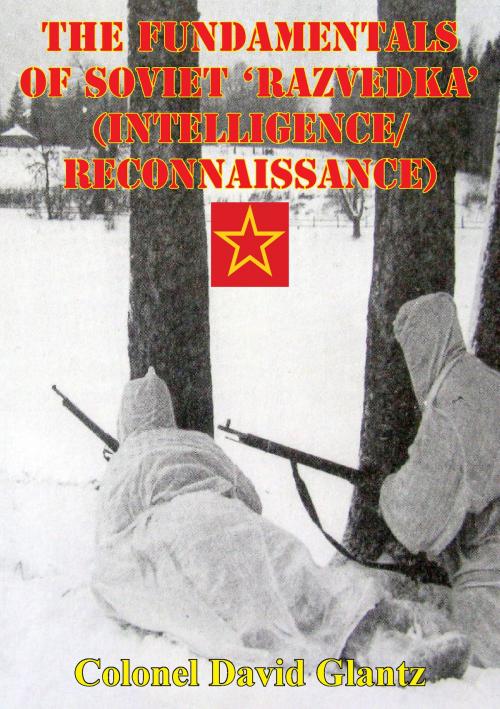The Fundamentals Of Soviet 'Razvedka' (Intelligence/Reconnaissance)
Nonfiction, History, Germany, European General, Military, United States| Author: | Colonel David M. Glantz | ISBN: | 9781782897699 |
| Publisher: | Verdun Press | Publication: | August 15, 2014 |
| Imprint: | Verdun Press | Language: | English |
| Author: | Colonel David M. Glantz |
| ISBN: | 9781782897699 |
| Publisher: | Verdun Press |
| Publication: | August 15, 2014 |
| Imprint: | Verdun Press |
| Language: | English |
Intelligence, simply defined as knowledge of the enemy and his intentions, is seldom a decisive factor in war. It does not alter the strength of contending armies and the overall war aims of contending states, and it may have little effect on the planning and conduct of operations. A force which lacks good intelligence may still succeed because of its strength, sound planning, and military efficiency. The converse is also true.
Sound intelligence, however, can affect a nation's decision to go to war in the first place; and, once that nation is at war, it can reveal enemy intentions and dispositions. While providing a foundation for sound planning, it also forms a basis for conducting and verifying the effects of deception. Consequently, intelligence provides leverage with which to accentuate the positive effects of military actions, be they offensive or defensive.- Intelligence collection, analysis, and exploitation is a difficult process, made more so by the fog of war and by chance, which makes its effects even less predictable...
Few nations have developed a healthier respect for the relationship between intelligence and warfare than has the Soviet Union. The four years of warfare on the Eastern Front during the Second World War, known by the Soviets as the Great Patriotic War, were unprecedented In scale and intensity. From the commencement of Barbarossa on 22 June 1941 to the end of the European war in May 1945, intelligence played a significant role in the course and outcome of operations. Most Westerners have only a sketchy awareness of that role. The Soviet intelligence failure of June 1941 and the apparent intelligence success at Kursk in 1943 have received attention in numerous works. Yet the appreciation of both has been, at best, superficial, replete with generalizations which have characterized most descriptions of war on the Eastern Front.
Intelligence, simply defined as knowledge of the enemy and his intentions, is seldom a decisive factor in war. It does not alter the strength of contending armies and the overall war aims of contending states, and it may have little effect on the planning and conduct of operations. A force which lacks good intelligence may still succeed because of its strength, sound planning, and military efficiency. The converse is also true.
Sound intelligence, however, can affect a nation's decision to go to war in the first place; and, once that nation is at war, it can reveal enemy intentions and dispositions. While providing a foundation for sound planning, it also forms a basis for conducting and verifying the effects of deception. Consequently, intelligence provides leverage with which to accentuate the positive effects of military actions, be they offensive or defensive.- Intelligence collection, analysis, and exploitation is a difficult process, made more so by the fog of war and by chance, which makes its effects even less predictable...
Few nations have developed a healthier respect for the relationship between intelligence and warfare than has the Soviet Union. The four years of warfare on the Eastern Front during the Second World War, known by the Soviets as the Great Patriotic War, were unprecedented In scale and intensity. From the commencement of Barbarossa on 22 June 1941 to the end of the European war in May 1945, intelligence played a significant role in the course and outcome of operations. Most Westerners have only a sketchy awareness of that role. The Soviet intelligence failure of June 1941 and the apparent intelligence success at Kursk in 1943 have received attention in numerous works. Yet the appreciation of both has been, at best, superficial, replete with generalizations which have characterized most descriptions of war on the Eastern Front.


![Cover of the book JAPANESE IN BATTLE 2nd Edition [Illustrated Edition] by Colonel David M. Glantz](https://www.kuoky.com/images/2014/august/300x300/9781782896197-Sd8R_300x.jpg)





![Cover of the book Why, How, Fleet Salvage And Final Appraisal [Illustrated Edition] by Colonel David M. Glantz](https://www.kuoky.com/images/2014/august/300x300/9781782894452-7NSe_300x.jpg)

![Cover of the book With The Trench Mortars In France [Illustrated Edition] by Colonel David M. Glantz](https://www.kuoky.com/images/2014/june/300x300/9781782892496-2FUQ_300x.jpg)


![Cover of the book T. E. Lawrence: Theorist And Campaign Planner [Illustrated Edition] by Colonel David M. Glantz](https://www.kuoky.com/images/2014/august/300x300/9781782894308-l8rb_300x.jpg)

